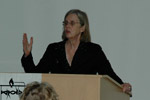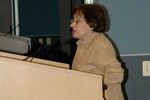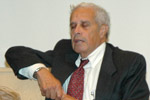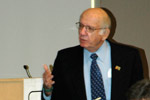- About Ramapo
- Academics
- Admissions & Aid
- Student Life
- Athletics
- Alumni
- Arts & Community
- Quick Links
- Apply
- Visit
- Give
November Teachers Workshop On Racial Science in the Holocaust
(PDF) (DOC) (JPG)November 17, 2007

Dr. Susan Bachrach
Attended by over 70 teachers from throughout New Jersey, “Barbarous Utopia: from Eugenics to Mass Murder”was the title of a Gumpert Teachers Workshop held at Ramapo College of New Jersey Friday, November 17. It was held in cooperation with the New Jersey State Commission on Holocaust Education and the U.S. Holocaust Memorial Museum, Washington D.C.
Under examination was a scientific movement that had benign beginnings in post-Darwinian genetics but which ended up providing the justification for the industrialized killing in Hitler’s Third Reich. Although the Nazi regime’s attempt to realize its vision of a biologically healthy and ethnically homogeneous population through “racial hygiene” was the workshop’s primary focus, the pervasive influence of the eugenics movement in the United States and Britain was also scrutinized.
Greeting participants was Ramapo College Provost Dr. Beth Barnett. She stressed the important role teachers play in imparting the lessons of the Holocaust to the younger generation and expressed the College’s support for Center for Holocaust and Genocide Studies in that effort.

Dr. Elaine Winshell
The featured speaker was Dr. Susan Bachrach, exhibition curator at the U.S. Holocaust Memorial Museum, Washington, D.C. Together with Dieter Kuntz, historian at the museum, she was responsible forDeadly Medicine: Creating the Master Race, the museum’s special exhibition on eugenics and genocidal policies of the Third Reich. Dr. Bachrach’s multi-media presentation traced the development of “Racial Science” from its ostensibly legitimate beginnings in the second half of the nineteenth century to its transformation in the Third Reich into a justification for sterilization and an enterprise for the destruction of human beings deemed unworthy of life.
Shedding light on the British and American involvement in eugenics was Dr. Elaine Winshell, professor emerita of Biology at Ramapo College and an expert on bridging the disciplinary divide between the natural and social sciences. Although Eugenics is today generally regarded as a pseudo-science and was discredited in the wake of murderous abuses in Germany during the Third Reich, Winschell reminded her audience that the second largest Eugenics movement was in the United States. Starting with Connecticut in 1896, state laws were enacted that prohibited marriage and that forced sterilization of the mentally ill in order to prevent the transmission of mental illness to the next generation. In some ways surprisingly, with the Supreme Court upholding their constitutionality in 1927, it was not until the 1950s that such legislation was finally rescinded.

Mr. Eric Mayer
Mr. Eric Mayer of Wayne, who grew up in the historic southwest German city of Worms, provided a first-hand view of racism in the classrooms of the Third Reich. Before being sent by his family to the relative safety of France, Mr. Mayer spent his first school years in an elementary school that became progressively more inhospitable to Jewish children. It was not only the racially tainted instruction that he and his fellow Jewish students had to face, but also the daily torment and attacks on the part of some of their non-Jewish peers.
Also taking part in the workshop was Dr. Paul Winkler, executive director of the New Jersey State Commission on Holocaust Education, who provided an overview of the State Mandate on Holocaust Education. In his view, examining the development of “racial science” provides an opportunity for classroom teachers to not only explore the roots of genocide, but also affords an entry point to to build awareness among the young people of New Jersey that the abuse of power in any society often has seemingly innocuous beginnings.

Dr. Paul Winker
Rounding out the workshop was a presentation on “Teaching about the History of Racism,” by Helen Simpkins, a consultant to the State Commission on Holocaust Education and retired supervisor of Social Studies for the Vernon School District. Her talk provided participants with methodological and practical guidance on how to integrate instruction about racial science into today’s middle and high school classroom.
An discussion at the conclusion of the day’s proceedings indicated an interest among attendees for a workshop to examine the background and development of the tragic genocide in the Darfur region of Sudan. As a consequence, the Center will be holding a workshop on April 19th, which while focusing on the unfolding tragedy of Darfur, will assist educators on teaching their students about contemporary genocides generally.
E-News Archives
| 2023 | 2022 | 2021 | 2019 | 2018 | 2017 | 2016 | 2015 | 2014 | 2013 | 2012 | 2011 | 2010 | 2009 | 2008 | 2007 |Copyright ©2025 Ramapo College Of New Jersey. Statements And Policies. Contact Webmaster.

Follow Us!